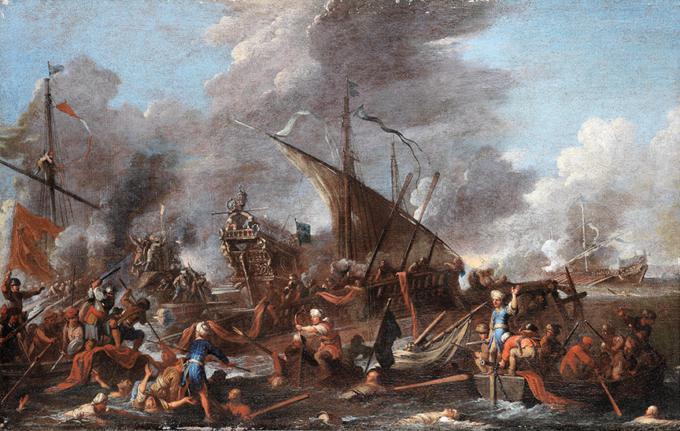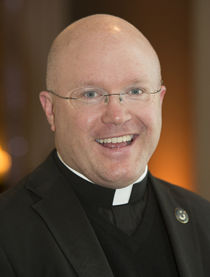
Faith
Even though synods have taken slightly different forms, the general concept of a synod as an ecclesial assembly either of bishops to govern in a permanent way (East) or of bishops, priests, and others to provide counsel when needed (West) has become stable and widely understood.

Landry
In Catholic piety and tradition, October is the month of the Holy Rosary. The month gets its identity from the Memorial of Our Lady of the Rosary on Oct. 7. It marks the date in 1571 when the outnumbered Christian fleet triumphed over the Muslim Turks in the Battle of Lepanto. The victory was credited to Our Lady's intercession as Pope St. Pius V had summoned all Christians to pray the rosary as he was doing so with the members of the Church of Rome. In anticipation of the first anniversary of the triumph, he established the feast of Our Lady of Victory, but died before its celebration. His successor, Pope Gregory XIII, changed the title of the feast the following year to the "feast of the Holy Rosary," focused on the particular means that had brought the Church to victory. This year is the 450th anniversary of that first liturgical commemoration.
It is therefore a very important occasion on which to grow in devotion to Our Lady, gratitude for her intercession, and prayer of the rosary. Various popes and saints have called the rosary the school of our Lady in which we ponder the joyful, luminous, sorrowful, and glorious moments of her and her Son's life. Through praying the rosary, we follow in the footsteps of the members of the early Church, who huddled around her for the 10 days of prayer between Jesus' ascension and the descent of the Holy Spirit, as she doubtless filled the early Church with details about the early hidden life of the blessed Fruit of her womb and led them to ponder with her contemplative gaze the deeper meaning of his public ministry and passion, death, and resurrection. Sts. Paul VI and John Paul II called the rosary the "compendium of the Gospel," not only because its mysteries take us through the life of Jesus into eternity but because through them Mary shows us how to respond faithfully and prayerfully to the totality of her Son's saving work.
It's particular fitting that the Church this October pray the rosary for the Synod on Synodality for a Synodal Church taking place Oct. 4-29 in the Vatican. Pope Francis himself asked for this after his Angelus meditation on Oct. 1, when he said to the crowds assembled in St. Peter's Square: "Today begins the month of October, the month of the rosary. ... I encourage everyone to experience the beauty of praying the rosary, contemplating the mysteries of Christ with Mary and invoking her intercession for the needs of the Church and of the world. Let us pray for ... the Synod of Bishops during this month in which the first Assembly on the theme of synodality in the Church takes place."
While the preparation for the Synod on Synodality has involved the largest formal consultation of Catholics throughout the world in a process involving individual dioceses, national episcopal conferences, and multinational regional assemblies, many Catholics are still not quite sure what it means.
Synod comes from a Greek expression for "journeying together" -- syn means "together" and hodos "way" -- and is meant to signify how the members of the Church convene to seek to follow the Lord. The word "synod" itself is ancient, referring to the collegial structure by which bishops, particularly in the East, regularly come together to help govern the churches entrusted to them, like, for example, the many Synods in the early Church that met to resolve doctrinal disputes.
After the Second Vatican Council, St. Paul VI established a Synod of Bishops in order to "foster closer unity between the Roman Pontiff and bishops, to assist the Roman Pontiff with their counsel in the preservation and growth of faith and morals and in the observance and strengthening of ecclesiastical discipline, and to consider questions pertaining to the activity of the Church in the world" (CIC 342). The Church also provided norms for Diocesan synods, comprised of "selected priests and other members of the Christian faithful" to assist the bishop with counsel for the good of the diocese when circumstances suggest it (CIC 460-468). Many dioceses have hosted synods to catalyze diocesan renewals.
Even though synods have taken slightly different forms, the general concept of a synod as an ecclesial assembly either of bishops to govern in a permanent way (East) or of bishops, priests, and others to provide counsel when needed (West) has become stable and widely understood. What's new and somewhat ambiguous are the expressions "synodality" and "synodal Church," both of which are involved in the title of the present "Synod on Synodality for a Synodal Church: Communion, Participation, and Mission." The terms aren't clearly defined and therefore presently mean different things to different people. In general, they're understood to mean a pilgrim Church journeying together, or a listening Church in permanent assembly, but how these for now elastic expressions fit with the Church's previous ecclesiological understandings and what they denote in terms of the destination of the common journey, or the voices being heard still await clarification.
Those clarifications are important because some are trying to use the "Synodal Process" to try to challenge and change the faith of the Church with regard to the Church's fidelity to revelation, the Church's hierarchical constitution, the Sacrament of Holy Orders, sexual morality, theological anthropology, and more. We have seen this tendency play out over the last few years in the Catholic Church in Germany's 2019-23 "Synodal Way," which Pope Francis and the Vatican Dicasteries for Bishops and the Doctrine of the Faith have repeatedly needed to correct. We have seen similar problems in recent national Synods in the Netherlands and Switzerland. Some in the Church are treating "synodal" and "synodality" as if they mean "everything is up discussion," including the deposit of faith, much like some after the Second Vatican Council used the so-called "spirit of the Council" as a green light to try to dismiss anything in the faith they didn't like or found contradictory to the spirit of the world. Some who have been invited to participate in the Synod on Synodality are already troublingly on the record hoping that the Synod will pave the way for changing Church teaching on various matters condemned by both Scripture and Tradition, in imitation of various Protestant Churches that have lost both their Biblical moorings and most of their members.
That's one of the reasons why prayer for the synod participants -- the pope, the organizing team, and the delegates -- in general is important, but also why prayer through Our Lady's intercession, like in the rosary, is particularly essential. Our Lady was the one chosen by God to help the members of the early Church get ready for the outpouring of the Holy Spirit. The Spirit leads us to life according to the Spirit not according to the flesh, reminds us of all Christ taught us, gives us the courage to put to death in us whatever is earthly and to seek the things that are above. Mary can help the members of the Church today, just like at her beginning, to discern the true voice of the Holy Spirit and not be deceived by graceless ventriloquism from within or below.
Throughout this month and beyond, we can pray through Mary's intercession that the journeying together of the Church today will mean faithfully following the footsteps of her Son, the Way, the Truth, and the Life. We can pray with her that the listening Church will truly attune to God's voice, not to polls of faith preferences of those who are thinking not as God thinks but as human beings do. We can pray through her maternal heart that the Church will grow in its capacity and zeal not just to welcome all God's children but help them to welcome Jesus and all his teachings, including those that require deepest conversion. We can ask the Lord that the Synodal Church will ultimately become more thoroughly Marian as it responds faithfully to those trying to manipulate Synodal structures to push for things -- like ecclesiastical power and unchaste love -- that would doubtless make the sinless Mother of God blush.
For the Synod on Synodality for a Synodal Church to fulfill the hopes Pope Francis has placed in it, for it to reinvigorate ecclesial communion, participation, and mission, we need Mary's intercession and guidance. She remains the Star of the Sea as the Church journeys together toward the eternal port, assailed not by Turkish battleships but by forces more subtle and potent.
- Father Landry is a priest of the Diocese of Fall River who is national chaplain to Aid to the Church in Need USA, a Papal Missionary of Mercy and a Missionary of the Eucharist for the US Bishops.
Recent articles in the Faith & Family section
-
Did you know?Father Robert M. O'Grady
-
Sowing the Seeds of FaithMaureen Crowley Heil
-
Bread left overScott Hahn
-
Scripture Reflection for July 28, 2024, Seventeenth Sunday in Ordinary TimeJem Sullivan
-
What the universal call to holiness entailsDr. R. Jared Staudt





